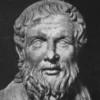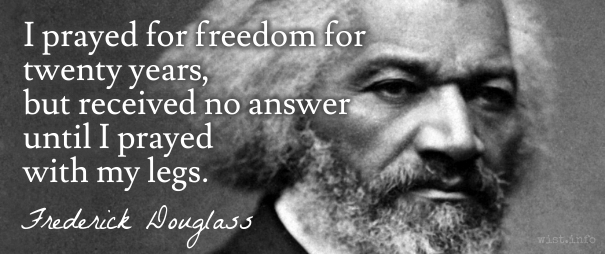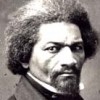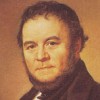More ease than masters, servants lives afford:
Think on that, Tom; nor wish to be your lord.
On a coarse rug you most securely snore:
Deep sunk in down he counts each sleepless hour.
Anxious betimes to every statesman low
He bows; much lower than to him you bow.
Behold him with a dun at either ear,
“Pray, pay,” the word; a word you never hear.
Fear you a cudgel? view his gouty state;
Which he would change for many a broken pate.
You know no morning qualm; no costly whore:
Think then, though not a lord, that you are more.[Quae mala sint domini, quae servi commoda, nescis,
Condyle, qui servum te gemis esse diu.
Dat tibi securos vilis tegeticula somnos,
Pervigil in pluma Gaius, ecce, iacet.
Gaius a prima tremebundus luce salutat
Tot dominos, at tu, Condyle, nec dominum.
‘Quod debes, Gai, redde’ inquit Phoebus et illinc
Cinnamus: hoc dicit, Condyle, nemo tibi.
Tortorem metuis? podagra cheragraque secatur
Gaius et mallet verbera mille pati.
Quod nec mane vomis nec cunnum, Condyle, lingis,
Non mavis, quam ter Gaius esse tuus?]Martial (AD c.39-c.103) Spanish Roman poet, satirist, epigrammatist [Marcus Valerius Martialis]
Epigrams [Epigrammata], Book 9, epigram 92 (9.92) (AD 94) [tr. Hay (1755)]
(Source)
Masters often think themselves more put-upon than their lazy, "carefree" servants/slaves, as do the rich versus the poor. "To Condylus" (Source (Latin)). Alternate translations:
The weal of a servant, and woe of his lord,
Thou know'st not, who so long hast service abhorr'd.
Securest of slumbers thy coverlet crown:
Thy master, my Condyl, lies watching in down.
Lords many hails he, the chill morn just begun:
Thou own'st no such duty, saluting scarce one.
To him this and that wight: Pray, pay what you ow.
To thee not a mortal pretends to say so.
Thou feat'st but a flogging: he's rackt with the gout.
A thousand sound lashes he'd rather stand out.
Nor sick thou at morning, nor pale with disease:
Who's moire, prithee, thou or thy master at ease?
[tr. Elphinston (1782), Book 4, Part 2, ep. 35]
Of the troubles of a master, and the pleasures of a slave, Condylus, you are ignorant, when you lament that you have been a slave so long. A common rug gives you sleep free from all anxiety; Caius lies awake all night on his bed of down. Caius, from the first dawn of day, salutes with trembling a number of patrons; you, Condylus, salute not even your master. "Caius, pay what you owe me," cries Phoebus on the one side, and Cinnamus on the other; no one makes such a demand on you, Condylus. Do you fear the torturer? Caius is a martyr to the gout in his hands and feet, and would rather suffer a thousand floggings than endure its pains. You indulge neither gluttonous nor licentious propensities. Is not this preferable to being three times a Caius?
[tr. Bohn's Classical (1859)]
The lowliest cot will give thee powerful sleep,
While Caius tosses on his bed of down.
[ed. Harbottle (1897), 9.93.3]
What are a master's ills, what a slave's blessings you do not know, Condylus, who groan that you are so long a slave. Your common rush-mat affords you sleep untoubled; wakeful all night on down, see, Gaius lies! Gaius from early morn salutes trembling many masters; but you, Condylus, not even your master. "What you owe, Gaius, pay," says Phoebus, and after him Cinnamus: this no one Condylus says to you. Do you dread the torturer? By gout in food and hand Gaius is stabbed, and would choose instead to endure a thousand blows. You do not vomit in the morning, nor are you given to filthy vice, Condylus: do you not prefer this to being your Gaius three times over?
[tr. Ker (1919)]
"How easy live the free," you say, and brood
Upon your long but easy servitude.
See Gaius tossing on his downy bed;
Your sleep’s unbroken tho’ the couch be rude;
He pays his call ere chilly dawn be red,
You need not call on him, you sleep instead;
He’s deep in debt, hears many a summons grim
From creditors that you need never dread,
You might be tortured at your master’s whim;
Far worse the gout that racks his every limb;
Think of the morning qualms, his vicious moods.
Would you for thrice his freedom change with him?
[tr. Pott & Wright (1921), "True Servitude"]
Condylus, you lament that you have been so long a slave; you don't know a master's afflictions and a slave's advantages. A cheap little mat gives you carefree slumbers: there's Gaius lying awake all night on feathers. From daybreak on Gaius in fear and trembling salutes so many masters: but you, Condylus, do not salute even your own. "Gaius, pay me back what you owe," says Phoebus, and from yonder so says Cinnamus: nobody says that to you, Condylus. You fear the torturer? Gaius is cut by gout in foot and hand and would rather take a thousand lashes. You don't vomit of a morning or lick a cunt, Condylus; isn't that better than being your Gaius three times over?
[tr. Shackleton Bailey (1993)]
Never the pros & cons of "slave," or "master,"
can you, mourning long servitude, discern.
The cheapest matting yields you dreamless sleep;
Gaius's feather-bed keeps him awake.
From crack of down Gaius respectfully
greets many masters; yours goes ungreeted.
"Pay day, Gaius, pay!" says Phoebus. "Pay! Pay!"
chimes Cinnamus. What man speaks thus to you?
Screw & rack, you dread? Gaius' gout stabs so
he'ld far prefer the thumbscrew or the rack.
You've no hangover habit, oral sex:
is not one life of yours worth three of his?
[tr. Whigham (2001)]
Quotations about:
slave
Note not all quotations have been tagged, so Search may find additional quotes on this topic.
Plato said that virtue has no master. If a person does not honor this principle and rejoice in it, but is purchasable for money, he creates many masters for himself.
Apollonius of Tyana (c. AD 15-100) Greek philosopher and religious leader [Ἀπολλώνιος]
Letters from Apollonius of Tyana, ep. 15, Letter to Euphrates [tr. Jones (2006)]
(Source)
The reference to Plato's Republic, X 617 E.
Aper’s teetotal. So what? I commend
Sobriety in a butler, not a friend.[Siccus, sobrius est Aper; quid ad me?
Servum sic ego laudo, non amicum]Martial (AD c.39-c.103) Spanish Roman poet, satirist, epigrammatist [Marcus Valerius Martialis]
Epigrams [Epigrammata], Book 12, epigram 30 (12.30) (AD 101) [tr. Michie (1972)]
(Source)
"On Aper." (Source (Latin)). Alternate translations:
Tom never drinks: that I should much commend
In Tom my coachman, but not Tom my friend.
[tr. Hay (1755)]
Frugal and sober, I commend
In both, my servant; not my friend.
[tr. Elphinston (1782), 12.114]
Ned is a sober fellow, they pretend --
Such would I have my coachman, not my friend.
[tr. Hoadley (fl. 18th C), §245]
Aper is abstemious and sober. What is that to me? For such a quality I praise my slave, not my friend.
[tr. Bohn's Classical (1859)]
"Now Aper is a sober man;
He never had a jag on."
Well, what of that? I wish my slaves,
Not friends, to hate a flagon.
[tr. Nixon (1911), "No Recommendation"]
Aper is abstemious, sober: what is that to me? A slave I praise so, not a friend.
[tr. Ker (1919)]
He's sober and abstemious? One commends
These qualities in slave, but not in friends.
[tr. Pott & Wright (1921)]
You're always sober, never drunk.
Such temperance is fine
In servants and domestics, but
Not in a friend of mine.
[tr. Marcellino (1968)]
Aper is dry and sober. What is that to me? I commend a slave so, not a friend.
[tr. Shackleton Bailey (1993)]
He's a clean and sober fellow?
Well, what's that mean to me?
He doesn't seem potential friend,
More like an employee.
[tr. Ericsson (1995)]
Aper is dry and sober. What good is that to me? It’s what I praise a slave for, not a friend!
[tr. @aleatorclassicus (2013)]
So what if Aper's sober! I commend
abstinence in a slave, not in a friend.
[tr. McLean (2014)]
The tyrant grinds down his slaves and they don’t turn against him, they crush those beneath them.
Emily Brontë (1818-1848) British novelist, poet [pseud. Ellis Bell]
Wuthering Heights, ch. 11 [Heathcliff] (1847)
(Source)
I prayed for freedom for twenty years, but received no answer until I prayed with my legs.
I believe any man who takes the liberty of another into his keeping is bound to become a tyrant, and that any man who yields up his liberty, in however slight the measure, is bound to become a slave.
The shepherd always tries to persuade the sheep that their interests and his own are the same.
Poor and free rather than rich and enslaved. Of course, men want to be both rich and free, and this is what leads them at times to be poor and enslaved.
[Pauvre et libre plutôt que riche et asservi. Bien entendu les hommes veulent être et riches et libres et c’est ce qui les conduit quelquefois à être pauvres et esclaves.]
Albert Camus (1913-1960) Algerian-French novelist, essayist, playwright
Notebooks: 1942-1951, Notebook 4, Jan 1942 – Sep 1945 [tr. O’Brien/Thody (1963)
(Source)
We hear often of the distress of the negro servants, on the loss of a kind master; and with good reason, for no creature on God’s earth is left more utterly unprotected and desolate than the slave in these circumstances. The child who has lost a father has still the protection of friends, and of the law; he is something, and can do something, — has acknowledged rights and position; the slave has none. The law regards him, in every respect, as devoid of rights as a bale of merchandise. The only possible acknowledgment of any of the longings and wants of a human and immortal creature, which are given to him, comes to him through the sovereign and irresponsible will of his master; and when that master is stricken down, nothing remains.
A slave has but one master; an ambitious man has as many masters as there are people who may be useful in bettering his position.
[L’esclave n’a qu’un maître; l’ambitieux en a autant qu’il y a de gens utiles à sa fortune.]
Jean de La Bruyère (1645-1696) French essayist, moralist
The Characters [Les Caractères], ch. 8 “Of the Court [De la Cour],” § 70 (8.70) (1688) [tr. Van Laun (1885)]
(Source)
(Source (French)). Alternate translations:
A Slave has but one Master, an ambitious Man a great many, all those who are useful to him in making his fortune.
[Bullord ed. (1696)]
A Slave has but one Master; an ambitious Man has as many as there are People useful to him in making his Fortune.
[Curll ed. (1713)]
A purchased Slave has but one Master: An ambitious Man must be a Slave to all who may conduce to his Aggrandizement.
[Browne ed. (1752)]
A slave has only one master; an ambitious man is enslaved to all those who may help to further his advancement.
[tr. Stewart (1970)]












